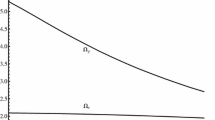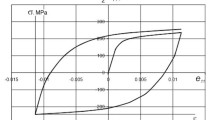Abstract
The stresses and strains in a partly plastic hollow disc inserted into a rigid container and subject to thermal loading are obtained under plane stress conditions according to the associated and non-associated flow rules. Both the yield criterion and plastic potential are represented by a conical surface in a three-dimensional space where the principal stresses are taken as Cartesian coordinates. In general, the yield criterion and plastic potential are not identical. Assuming that the yield criterion is given the effect of the plastic potential on the radial distribution of strains is revealed. The associated flow rule and plastically incompressible material are considered as special cases of the general solution. The residual stresses and strains are determined as well. It is shown that reversed plastic flow can occur and the effect of the plastic potential on the radial distribution of residual strains is more pronounced as compared to that at the end of loading.








Similar content being viewed by others
References
Hodge PG, White GN (1950) A qualitative comparison of flow and deformation theories of plasticity. Trans ASME J Appl Mech 17:180–184
Druyanov B (1993) Technological mechanics of porous bodies. Clarendon Press, New York
Alexandrov S, Harris D (2006) Comparison of solution behaviour for three models of pressure-dependent plasticity: a simple analytical example. Int J Mech Sci 48:750–762
Alexandrov S, Kuo C-Y, Jeng Y-R (2013) Effect of the shape of pressure-dependent yield surfaces on solution behaviour near frictional interfaces. J Eng Math 79:143–152
Alexandrov S, Alexandrova N (2001) Thermal effects on the development of plastic zones in thin axisymmetric plates. J Strain Anal Eng Des 36:169–176
Alexandrova N, Alexandrov S (2004) Elastic–plastic stress distribution in a plastically anisotropic rotating disk. Trans ASME J Appl Mech 71:427–429
Kleiber M, Kowalczyk P (1996) Sensitivity analysis in plane stress elasto-plasticity and elasto-viscoplasticity. Comput Methods Appl Mech Eng 137:395–409
Liu H (2013) Unified sand modeling using associated or non-associated flow rule. Mech Res Commun 50:63–70
Wilson CD (2002) A critical reexamination of classical metal plasticity. ASME J Appl Mech 69:63–68
Safaei M, Zang S, Lee M-G, Waele WD (2013) Evaluation of anisotropic constitutive models: mixed anisotropic hardening and non-associated flow rule approach. Int J Mech Sci 73:53–68
Chenga L, Jiaa Y, Oueslati A, Saxcéa GD, Kondo D (2012) Plastic limit state of the hollow sphere model with non-associated Drucker–Prager material under isotropic loading. Comput Mater Sci 62:210–215
Alexandrov S, Jeng Y-R, Lomakin E (2014) An exact semi-analytic solution for residual stresses and strains within a thin hollow disc of pressure-sensitive material subject to thermal loading. Meccanica 49:775–794
Hill R (1950) The mathematical theory of plasticity. Pergamon Press, Oxford
Acknowledgments
The research described in this paper has been supported by the grants RFBR-14-01-93000 and NSH-1275.2014.1.
Author information
Authors and Affiliations
Corresponding author
Rights and permissions
About this article
Cite this article
Alexandrov, S., Mustafa, Y. A qualitative comparison of flow rules of pressure-dependent plasticity under plane stress conditions. J Eng Math 89, 177–191 (2014). https://doi.org/10.1007/s10665-014-9709-2
Received:
Accepted:
Published:
Issue Date:
DOI: https://doi.org/10.1007/s10665-014-9709-2




